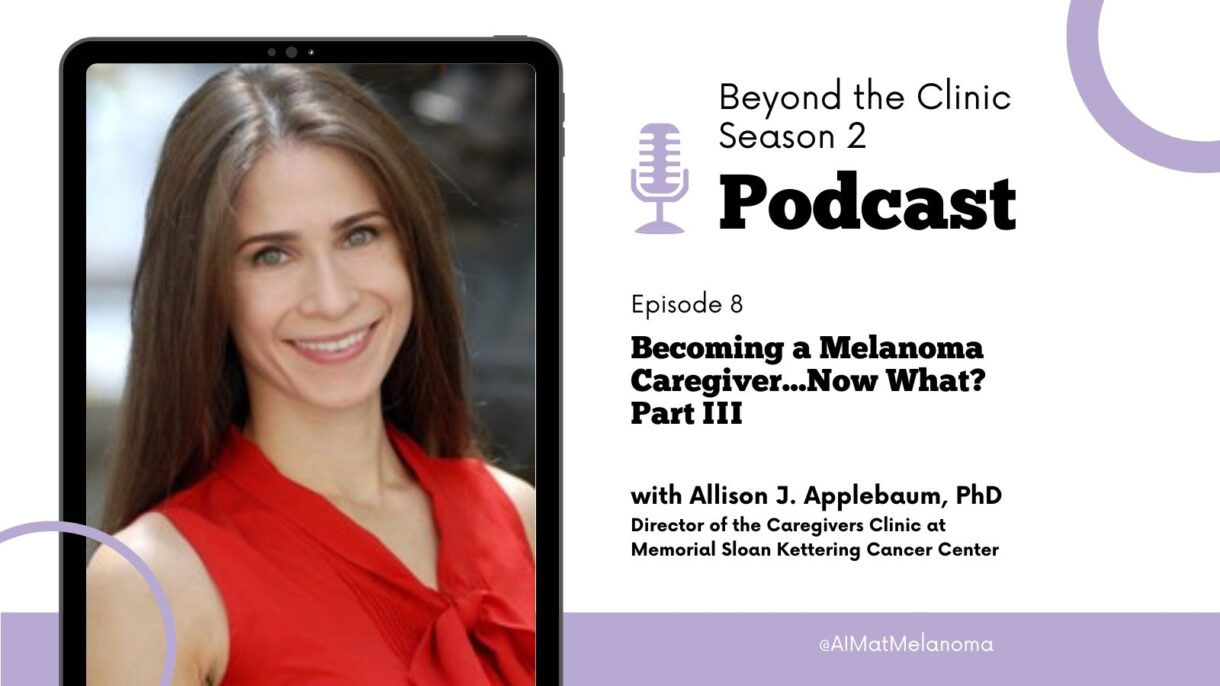Becoming a Melanoma Caregiver…Now What? PART III with guest host, Melissa Wilson, PA-C, MPAS, UPMC Hillman Cancer Center

Last year, over 197,000 Americans were diagnosed with melanoma—and we know they won’t go through that experience alone because there will be a caregiver, usually a family member or close friend, at their side. Becoming a caregiver is often unexpected and life-changing. To talk about the benefits of caregiving, the types of support that are most effective, and essential communication skills for caregivers, Melissa Wilson, PA-C, MPAS, and AIM’s Ask a Medical Expert, sits down with Allison J. Applebaum, Ph.D., Director of the Caregivers Clinic at Memorial Sloan Kettering Cancer Center.

About our Guest: Dr. Allison J. Applebaum is an Associate Attending Psychologist in the Department of Psychiatry and Behavioral Sciences, Memorial Sloan Kettering Cancer Center (MSK), and an Associate Professor of Psychology in Psychiatry at Weill Cornell Medical College. She is the Founding Director of the Caregivers Clinic at MSK, housed in the Counseling Center. The Caregivers Clinic is the first of its kind and provides comprehensive psychosocial care to family members and friends of patients who experience significant distress and burden as a result of their caregiving role. Dr. Applebaum’s program of research focuses broadly on the development and dissemination of psychosocial interventions for cancer caregivers, as well as understanding the impact of caregiver psychosocial wellbeing, prognostic understanding and communication skills on advanced care planning. Her interest in cancer caregiver research began during her fellowship in psycho-oncology at MSK, during which her clinical work focused primarily on providing care to patients at the end of life. Such encounters highlighted the significant distress and unmet needs experienced by those patients’ caregivers, the family members and friends who are so intimately involved in the care of patients but often not recognized for – and supported in – doing so. As a result, Dr. Applebaum has devoted her career to helping to address the needs of caregivers as they become increasingly critical members of our treatment teams.
A key theme that emerged in Dr. Applebaum’s work in the Caregivers Clinic at MSK was “sitting with uncertainty,” a challenge faced by all caregivers, regardless of their loved one’s site or stage of cancer. The ability to tolerate uncertainty has benefits for caregivers’ wellbeing during and after caregiving, as well as for the patients for whom caregivers provide care. Dr. Applebaum’s newly funded study “A Randomized Controlled Trial of Emotion Regulation Therapy for Cancer Caregivers: A Mechanism-Targeted Approach to Addressing Caregiver Distress” seeks to test the efficacy of Emotion Regulation Therapy for Cancer Caregivers (ERT-C), a contemporary cognitive behavioral therapy (CBT) developed to deliberatively target processes underlying the distress associated with caregiving and assist caregivers with their capacity to sit with uncertainty. In this trial, caregivers are randomized to receive 8 individually delivered sessions of ERT-C, or 8 sessions of Cognitive Behavioral Therapy for Cancer Caregivers, all delivered over telepsychiatry. In addition to evaluating emotion regulation skills and symptoms of anxiety and depression, the investigative team is examining relative change in salivary markers of stress and systemic inflammation in caregivers, and quality of life in the patients for whom caregivers provide care. This program of research seeks to improve the psychological and physical health of caregivers, as well as to help shift the current research paradigm from viewing caregiving as solely a period of high risk and detriment to one that includes the opportunity for personal growth and resilience.
Recent Posts

Behavioral Addiction Responsible for Excessive Indoor Tanning

Announcing AIM at Melanoma’s Official Sunscreen Partner, WearSPF

Red Hair Genetics: 5 Things You May Not Know

Surviving & Thriving: From Melanoma Survivor to Sun Safety Advocate


